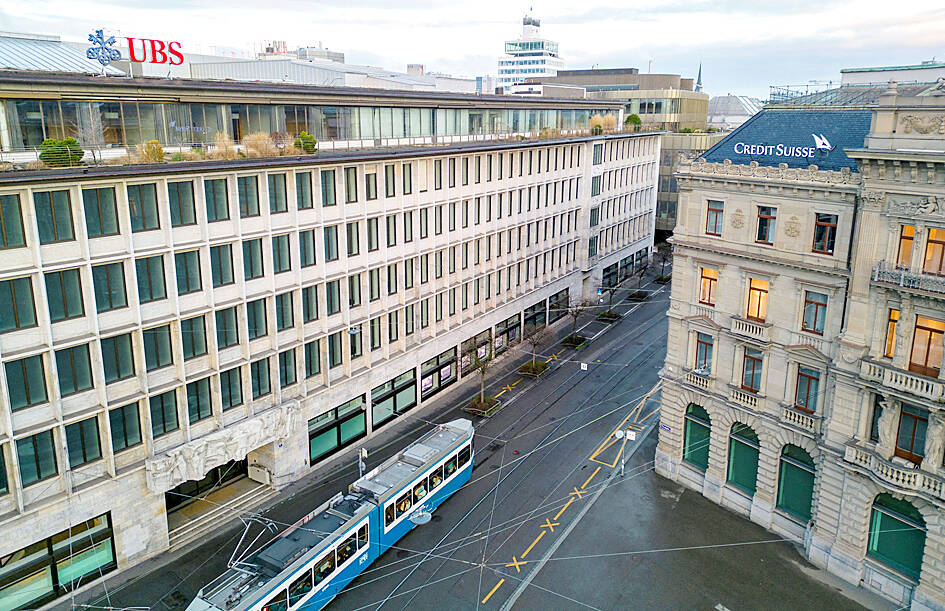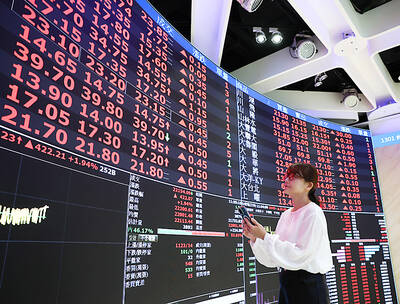UBS Group AG expects to complete its acquisition of Credit Suisse Group AG as early Monday next week, it said in a statement yesterday.
The closing of the deal is still subject to certain conditions, which UBS can waive, the statement said.
Upon completion, Credit Suisse shares would be delisted from the New York Stock Exchange on Monday next week and the Swiss SIX Stock Exchange on Tuesday next week.

Photo: Reuters
Shareholders of Credit Suisse will receive one UBS share for every 22.8 outstanding shares held. All of Credit Suisse’s outstanding debt securities will become obligations of UBS.
UBS had originally guided that the takeover of its smaller rival would be completed as early as the end of last month or beginning of this month. However, the closing risked delay because UBS and the Swiss government were still negotiating the precise terms of the 9 billion Swiss francs (US$9.9 billion) state guarantee for losses the bank might incur, Bloomberg News previously reported.
UBS agreed to take over Credit Suisse this year in an emergency sale backed by the Swiss government, amid fears that the smaller troubled competitor was hurtling toward bankruptcy.
UBS has said it might need to delay its second-quarter results publication from the original date of July 25 to have enough time from the deal’s closure to provide combined pro-forma financial statements.
The bank expects that principal terms of the so-called Loss Protection Agreement would be set before the closing of the acquisition, but not the regulatory implications, it said in a filing last month.
UBS and regulators are still determining what adjustments to liquidity and capital requirements and risk-weighted asset measures the combined entity will need to make.
The Swiss government’s loss-guarantee was necessary, because there was little time to do due diligence and Credit Suisse has hard-to-value assets that UBS plans to wind down. If that results in losses, UBS would assume the first SF5 billion and the government the next SF9 billion.
UBS last month said it expected markdowns of about US$13 billion on Credit Suisse assets and also estimated that legal liabilities might cost as much as US$4 billion over 12 months. It also said it might see an estimated US$34.8 billion paper gain as a result of the takeover.
Meanwhile, UBS is looking to retain more than 100 Credit Suisse investment bankers across Asia, seeking to shore up talent in markets where its Swiss rival has stronger presence, people familiar with the matter said.
The bank is in advanced discussions to keep dozens of Credit Suisse’s senior dealmakers in the region, spanning from South Korea, Thailand, Vietnam to India, proposing compensation targets for a group of managing directors, the people said, asking not to be identified because the matter is private.
Among the people targeted to stay on is Allan Chu (朱達之), Asia-Pacific head of telecommunications, media and technology, as well as various country heads in South Korea and some of the Southeast Asia markets, the people said.
UBS would also retain a considerable number of bankers in India, where the merger would enable it to rebuild its presence after shutting down the local team in late 2021.
The retention target of more than 100 bankers does not include China, where the two banks have considerable overlaps.
In mainland China, UBS has held talks with Janice Hu (胡知鷙), Credit Suisse’s country chief executive officer, as well as a few other senior bankers, the people said. Hu’s role is still being discussed. The final number of China bankers being kept would depend on discussions with regulators, they added.

UNCERTAINTIES: Exports surged 34.1% and private investment grew 7.03% to outpace expectations in the first half, although US tariffs could stall momentum The Chung-Hua Institution for Economic Research (CIER, 中華經濟研究院) yesterday raised its GDP growth forecast to 3.05 percent this year on a robust first-half performance, but warned that US tariff threats and external uncertainty could stall momentum in the second half of the year. “The first half proved exceptionally strong, allowing room for optimism,” CIER president Lien Hsien-ming (連賢明) said. “But the growth momentum may slow moving forward due to US tariffs.” The tariff threat poses definite downside risks, although the scale of the impact remains unclear given the unpredictability of US President Donald Trump’s policies, Lien said. Despite the headwinds, Taiwan is likely

READY TO BUY: Shortly after Nvidia announced the approval, Chinese firms scrambled to order the H20 GPUs, which the company must send to the US government for approval Nvidia Corp chief executive officer Jensen Huang (黃仁勳) late on Monday said the technology giant has won approval from US President Donald Trump’s administration to sell its advanced H20 graphics processing units (GPUs) used to develop artificial intelligence (AI) to China. The news came in a company blog post late on Monday and Huang also spoke about the coup on China’s state-run China Global Television Network in remarks shown on X. “The US government has assured Nvidia that licenses will be granted, and Nvidia hopes to start deliveries soon,” the post said. “Today, I’m announcing that the US government has approved for us

When Lika Megreladze was a child, life in her native western Georgian region of Guria revolved around tea. Her mother worked for decades as a scientist at the Soviet Union’s Institute of Tea and Subtropical Crops in the village of Anaseuli, Georgia, perfecting cultivation methods for a Georgian tea industry that supplied the bulk of the vast communist state’s brews. “When I was a child, this was only my mum’s workplace. Only later I realized that it was something big,” she said. Now, the institute lies abandoned. Yellowed papers are strewn around its decaying corridors, and a statue of Soviet founder Vladimir Lenin

The National Stabilization Fund (NSF, 國安基金) is to continue supporting local shares, as uncertainties in international politics and the economy could affect Taiwanese industries’ global deployment and corporate profits, as well as affect stock movement and investor confidence, the Ministry of Finance said in a statement yesterday. The NT$500 billion (US$17.1 billion) fund would remain active in the stock market as the US’ tariff measures have not yet been fully finalized, which would drive international capital flows and global supply chain restructuring, the ministry said after the a meeting of the fund’s steering committee. Along with ongoing geopolitical risks and an unfavorable